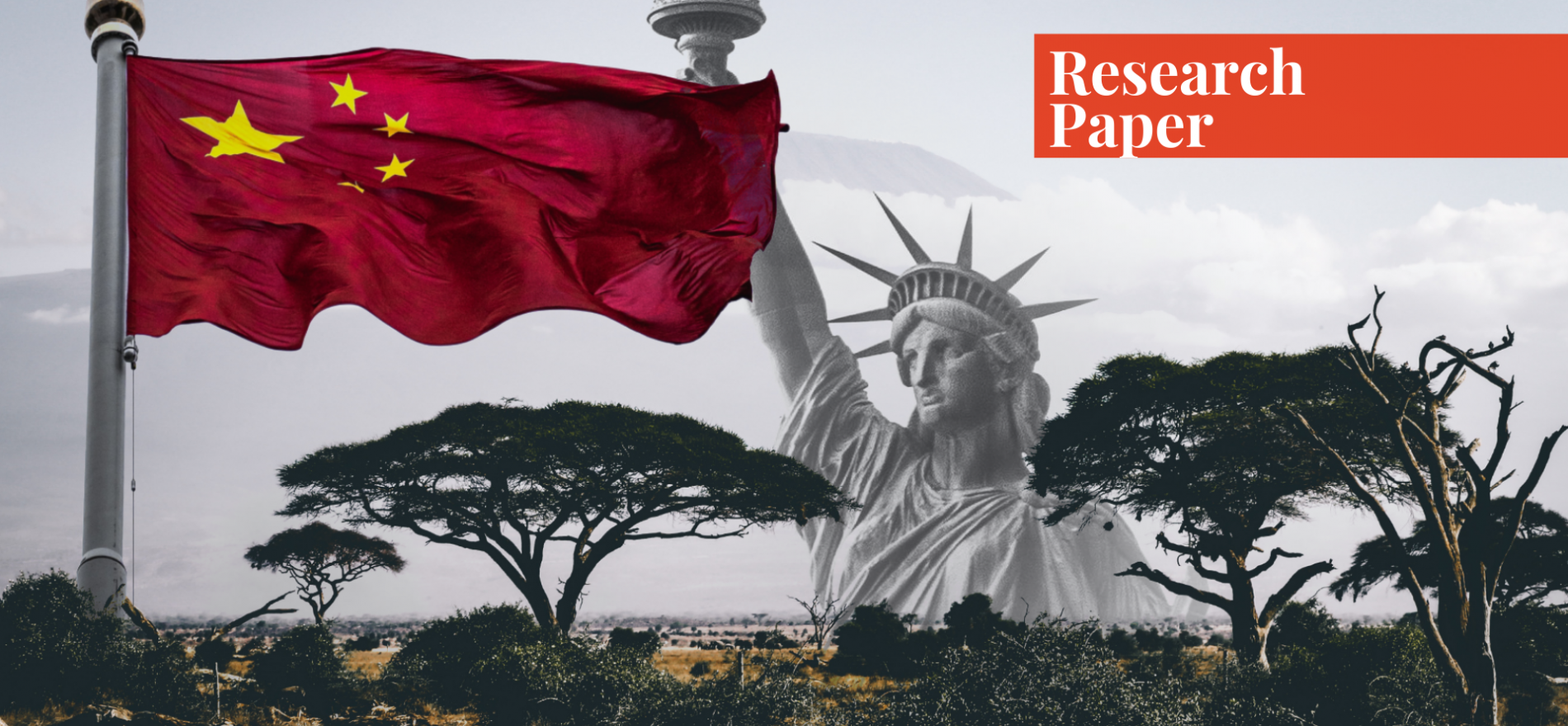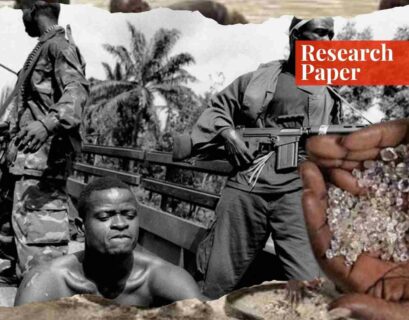Waleed Yawer works as an Assistant Research Officer at the Islamabad Policy Research Institute. He did his M.Phil in International Relations from the National Defence University, Islamabad, with a focus on international political economy. His areas of interest include American and British domestic and foreign affairs.
Introduction
The United States and China have been at loggerheads with each other on an ideological scale throughout the 20th century. Seen by many as a rather instrumental consequence of differing social constructs to achieve power, the relationship between the two countries has fluctuated throughout. Many would agree that the epitome of positive diplomacy between the two nations was reached in the 1970s under President Nixon. It can hence be argued that the ideological differences have not been primordial – given that the start of this century has seen a shift in Chinese domestic and international foreign policies, marked by an increasing role in the international market.
The budding U.S.-China bilateral economic partnership is a remarkable expression of the interdependence that has come to form, regardless of the trade imbalance caused, which can stem the two-way flow of capital in symmetry. On the contrary, it should be understood that economic interactions give way to political implications which can potentially sabotage the trade relationship based on principles of hegemony, and balance of power. As China opens up to the international market, its influence in the region grows every single day. Given that China has expanded its economic engagement from the Middle East to Africa, there is greater pressure on America to deter Chinese influence in the continent (which has been marked mainly by political, economic and, social turbulence until the turn of the new century).
While America wants to maintain its trade relationship with China, it does not in any way wish for China to gradually expand its influence transnationally, given that it has already established itself as a “leader” in regional politics. With the power imbalance in Africa, it is more important to focus on the nature of power imbalance, and the U.S. counter policies set out to manage the emerging African dilemma. Given that the United States, as a global leader in advocating for normative values, has clearly defined its limitations in Africa, China is not served by similar notions – for it is vying for economic dominance regardless of the domestic nature of the states it is partnering with.
This paper argues that U.S. counteraction is plausible through dimensions that have been thought reasonable when it comes to the U.S.-China relationship in Africa. While Chinese popular influence decreases gradually within the general African population, it can serve as a driving factor for America to engage in social reconstruction of the African society, to once again carve out its image as a nation able to serve the growing economic needs of the African population. The reservation that America has, in engaging itself with states like Sudan or Equatorial Guinea, is the intensity of human rights violations witnessed in that part of the world – and that investing in those areas may be considered an endorsement of the same.
Problem Statement
This paper begs the question: How can America integrate itself within the African economy more effectively as a means to counter the growing Chinese economic monopoly based on principles of comparative advantage and economic security within the region?
Research Questions
- Why has and should Chinese influence in Africa induce a more economically aggressive approach by America?
- What circumstances can drive America to integrate itself in the African economy with relevance to China, as a means to create an economic symmetry?
- Keeping in mind the American political reservations in Africa, how can they achieve a balance of power through economic means in a status quo dominated by the Chinese?
Hypothesis
The paper is built on the premise that economic integration within Africa is a foreseeably suitable way for America to create an economic symmetry with relevance to American and Chinese presence on the continent.
Literature Review
“China’s direct investment in Africa: Reality versus myth” is a research paper written through the collaborative efforts of Wenjie Chen, David Dollar, and Heiwei Tang – and published through the Brookings Institute in September 2015. What the paper lacks, is a determination of the limitations of American economic engagement in Africa (because of the heavily transparent ideologies the U.S. foreign policy is laden with) in comparison to the Chinese foreign policy in Africa, which follows a rather constructivist approach i.e. it has its eye on dominating the service sector, much to the horror of America.
Determining the limitations will further point out the means to counter or compete whether the U.S. can engage itself in without compromising on the essential tenets of its foreign policy, especially in Africa, a continent just setting out on a path of economic bloom. The paper titled “Africa, China, the United States, and Oil” written by David H. Shinn in 2016, shed some light on America’s reluctance to invest and work with politically unstable countries but has not mentioned the political implications drawn from Chinese investment in Sudan and other conflict-prone countries that have driven a political wedge between Chinese and American interests.
Furthermore, it does not discuss how America wishes to play out the entire scenario with Chinese investments riding heavy on its back. It also fails to highlight the importance of state-oriented and controlled energy companies that the U.S. needs to endorse in Africa for long time strategies, instead of MNCs which have had a monopoly over the African markets as far as the United States is concerned. “US, China compete to woo Africa” is a research article published by the Pew Research Center, written by Katie Simmons in August 2014.
Although this article represents a poll targeting seven countries with FDI mutually pouring in from America and China, it has not mentioned at all, the major sources of natural oil and even human resource (Ethiopia) for China, even though it has a clear monopoly. Now it might be stated that because of the reduced Human Development Index in such countries, it is improbable to conduct a valid poll from within the society, but the fact remains that Chinese interests are satiated through the three countries outlined in the previous paragraph.
The research paper titled “China’s Influence in Africa: Implications for the United States” written by Peter Brookes and Ji Hye Shin in 2006. Since the article is a presentation of all possible paths that the U.S. can take to counter Chinese dominance in the region, it does not take into account the more feasible approach of economic integration between the two powers. The integration will bring about a more convenient strategy for goal accomplishment and will prevent Africa from being victimized as another battleground for a proxy conflict between two great powers.
“The Limits of US-China cooperation in Africa” is a research paper written By Yun Sun in April 2015, and published by the Brookings Institution. The article provides an opposing view to the dominant rhetoric in the literature present on African policies of great power but has completely undervalued economic interdependence that has begun to occur in Africa. This interdependence can potentially glue the powers together to regulate their stances, given the structure of the globalized market. This is also keeping in view the service industry (based mostly on its strength in Africa) which is beginning to offer a declining perspective for Chinese investments, what with competing states such as India and the United Kingdom slightly edging into the competition as well – dividing the human resources as they do so.
Theoretical Framework
After the balance has been established, “Complex interdependence” describes the equation which points towards the monetary dependence that economic integration of the U.S. into the Chinese articulated system in Africa would represent. The political implications that follow because of the economic parity, increase the fronts across which American and Chinese interests will be bargained and interacted for. American presence will force policy think tanks to revalue the importance of social re-engagement, especially considering that Chinese presence has started to take its toll on the general population. This is the same general populace who in the seven-state poll (as mentioned in the research review) trusts American involvement more than they trust Chinese.
Furthermore, a shift of the U.S. role in Africa from conflict resolution and peacemaking missions, to an economic spread, will mean that the military will not have to be as empowered in the region as before. Reduction of both U.S. (and if possible, U.N. peacekeepers) will be imperative to create a public perception that the U.S. is not following imperialist measures (something that America has claimed recurrently that China seeks to do) and hence improve the American diplomatic and social profile on the continent. Hence with different dimensions added to the relationship between China and America in Africa, the agenda will include diversified issues of engagement between both states.
China in Africa & Implications for America
Chinese investment in Africa has meandered ahead of the U.S. at the turn of the new century. Beyond the scope of a constructivist paradigm in Chinese – African economic relations, which perceptively reflects on China assisting Africa through a partnership between two “developing”1 regions, CFAC (The China Africa Cooperation Forum) has played its bid in the trade relationship as the epitome of Chinese engagement in Africa since 2000. The CFAC propelled Chinese Foreign Direct Investment volume from $5.6 billion to $32.2 billion from 1994 to 2004 and eventually $160 billion in 2011 which is a significant representation of the success that the Chinese structural growth in Africa has enjoyed.
Since its establishment, CFAC has been instrumentally carved into a stronghold as a launching platform for 77 Chinese companies involved in the African economy. The trade solidarity on display has, in turn, led to social and communal challenges persistent in Africa, being met head-on by China, as a means of expanding their legitimacy. China, over the years, has invested in healthcare, in providing treatments to HIV patients as well as in infrastructural development with roads and railways as the primary sources of transportation used within the continent. The battleground for the monopoly on oil resources has seen Africa rise into combat for resources.
While its total share of oil is drastically lower than the amount in the Middle East, it has been expected that production will jump to a staggering 91% between the first three decades of the 21st century. What distinctly puts African oil ahead of the Middle Eastern demand is the reduced quantity of Sulphur2 which is more beneficial for the industry, and thus more heavily demanded. Nigeria, Angola, Sudan, and Equatorial Guinea race ahead in terms of the oil resources harbored within their territories. Chinese presence in all oil-rich African states 80% of its trade within Africa based on oil resources is matched by an increase in U.S. oil imports from Africa which have risen to 22% in the last decade.
The unparalleled investment in the service sector by China has paved the way for acceptance among communities, regardless of the nature of governance. Out of the twenty-five different areas of investment overseen by China, the majority are associated with skill development within the service provision sector.3 Not only has this paved the way for social cohesion among the Chinese and African business classes with Chinese norm laden foreign policy tending to peaceful existence standing true but has led to a counter American narrative that sees the Chinese policy as relaxed with little focus on hydrocarbon extraction.
The same American narrative is simultaneously expounded upon through the Pew Center poll wherein Kenya, Ghana, Tanzania, Senegal, South Africa, Uganda, and Nigeria, have reflected a gradual but minor decrease in Chinese acceptability within the African community at large.4 However, Chinese trade volume in the mentioned countries has been relatively low compared to Angola, Sudan, Guinea, Congo, and Ethiopia where the trade balance has always been tilted in China’s favor. Neither has the poll taken into account the business class which monitors and executes trade agreements.
The nature and modes exercised for investment by China have varied from liberal economic models still currently in use by the United States. As the Chinese mandate in Africa is along the lines of the “aid, trade, invest” policy5, it provides loans without interest to increase African export trade volume, which in turn helps reduce the economic asymmetry between African trade with the West. On the contrary, the IMF’s condition laden loans6 based on structural adjustment ventures set out to alter the political and economic situation within Africa. Analytically, then Chinese loans with guarantees provide African states with greater incentives to skip IMF regulations altogether.
Furthermore, Chinese enterprises operating in Africa are regulated through state-sponsored Chinese banks namely the ICBC (Industrial and Commercial Bank of China) and the China Export-Import Bank which adds to the convenience in establishing economic corridors among African countries that carry out the bulk of Chinese African trade.7 The convenience in the interaction between markets and suppliers form either end has boosted the demand for Chinese products in Africa reciprocally. However, America pursuing a domestic, and now an international policy of deregulation has seen a greater investment flowing into Africa on part of privatized multi-national corporations which not only conduct businesses on their own terms but at certain occasions clash with the national interest of the state clouding national judgment in terms of its African policies.8
Although the numbers speak for themselves, the academic interpretation and Chinese foreign policy principles pursued in Africa have affected the global order and provoked an increased American response in greater intellectual volume. China, following a pattern of Peaceful Coexistence, has established grounds for Chinese investment based on respect for African sovereignty i.e. no meddling within domestic affairs of any African state, and guaranteed exponential growth in the economy for all states in partnership with China. The American view on investment in Africa is rounded structurally and based on setting conducive circumstances for investment, be it political, social, or economic; whereas China attempts to shape its foreign policy around the domestic grass-root level requirement of the people.
The step ahead for China is theoretically seen because of an individualistic paradigm that does not take into account structural settings and regulations that obstruct the flow of foreign direct investment. Their policies are designed to meet social requirements, which in the long run translate into mutual trust in their economic relationship. China’s effective transportation mechanisms are an added advantage to an already strong trade relationship. There also lies a political mandate at the heart of Chinese investment in Africa, the likes of which have led the U.S. in a movement to increase their influence proportionally. With China overlooking regulatory constraints (which otherwise the West has had to adhere to), it intends to rally African interest into denouncing Taiwan in the political scenario.
The one state, one vote policy followed in the U.N., (when taking into account more than 50 African votes and support for China) has all the potential to create ripples within Taiwanese diplomatic support, most notably by the United States. The influence that China can draw from within the African community in international institutions, amounts further towards its negotiating leverage which China will gladly employ at the right time. Decades of diplomatic and economic silence from the U.S. is now being reduced, to hinder the Chinese growing influence towards the West and onwards. While the U.S. embarks on its own mission to deter Chinese influence, it is no secret that the status quo has been set and maintained by China, which stands as the reference point for American economic measures and their implications in Africa.
Realizing the Need for American Integration
American integration within the African community rests within the structural confines of the African Growth and Opportunity Act (AGOA), which has only very recently been shaped into a diverse source of cultural and political interaction between the two regions. Established in 2001, the Act has propelled trade volume by more than 50% in a decade but has not met with social demands of acceptability of American presence in Africa until recently. The 2011 Hilary Clinton visit to Africa including her all-important remarks on China, paved the way for a renewed sense of importance for American engagement in Africa.
The speech was laden with Chinese imperialist rhetoric that was used as the base for American involvement in African cultural exchange to present all-round imagery of America as being interested in not merely the natural resources at hand but also in expanding the financial capacity of economic and service-based organizations. The move, following the Millennium Challenge Corporation program in the first tenure of George W. Bush to set up an economic forum for the establishment and eradication of material deficiency in Africa, culminated into Obama’s invitation to all African leaders for a summit in the U.S. in 2014.
Obama’s vision9 was reinforced through his trip to Ethiopia and Kenya in 2015, after his declaration that a need for integration with African communities was a motive much ignored within U.S. policy circles. Although one policy matter that was made clear in Obama’s visit was America’s reluctance to invest in states with histories of violence and continued civil unrest based on dictatorial measures based on OECD regulations.10 Although the U.S. revoked Eritrean, Sudanese and Zimbabwean invitations to the White House in 2014 (reiterating the conditions that are required by the U.S. from Africa) Obama’s visit to Ethiopia reinvigorated the same principles when he pointed out the crimes against journalists and the basic right of freedom of speech as impeding continuous civil growth.11
Despite American reservations, it has been deeply involved militarily in Africa, which has added to the plethora of factors affecting the complexity of relationships within the continent. The American African Command (AFRICOM) established as the administrative center for military communications between the U.S. State Department, and its physical presence to deter entities like Boko Haram, Al Qaeda’s Maghreb faction, Al Shabaab, Kony’s Lord Resistance Army based in Uganda, and Islamic fundamentalists across the North-Eastern African coast has, in addition to assisting in securitization, enabled China to work on its economic presence.
While the debate that the U.S. has expanded militarily in Africa in oil specific areas to contain Chinese influence rings throughout academic circles, it is no secret that the Chinese response has been far from accepting American presence.12 The U.S. has continued to press on African economies to work in tandem with liberalizing political principles in their countries. The aforementioned American reservations in Africa are grounded in reality constructed through Chinese investment in Africa, without considering political implications. Chinese investments in Zimbabwe and Sudan have been seen as having a serious impact on supporting the authoritarian regimes in the countries.
Chinese investment in Zimbabwe has transcended economic modes and stepped up to aid the regime with military-grade weapons (most notably aircrafts communication jamming mechanisms) which have in turn been used by the government in oppressive measures over the public.13 The very same circumstantial rhetoric surrounded the Chinese oil trade with Sudan. A country marred by civil conflict witnesses an annual amount of $500 million flowing in through oil export to China. The amount, then reportedly spent on arms and ammunition, has been used in quelling the rebellion through extremely violent means.
Sudanese state ambitions have thus been legitimized through Chinese economic policies which have diminished the attempt to draw peace processes within the sparring parties by regional and Western powers – inclusive of the Comprehensive Peace Agreement of 2005 which declared a cessation in hostilities and division of resources between North and South Sudan. The treaty failed to make any grounds whatsoever. Furthermore, with the realization within African economies of the need to employ local skills and industry management to influence internal development and reduce the quid pro quo status, they have begun to regulate foreign direct investment in a manner that reinforces and articulates the indigenous labor force.
China realized that the transition worked beautifully on the service sector, with the majority of its trade expression focusing on vocational training to enhance the service industry. While the United States has posed such Chinese intentions as direct imperialist measures, the fact remains that Chinese influence within social ranks adds to their already favored approach within repressive governments. Hence, it remains to be seen in U.S. policy terms as to whether the focus lies on shaping the narrative to rally the international arena against China in the global security paradigm – or if the focus is more towards more spontaneous yet long term beneficial economic means based on notions of comparative advantage within Africa and economic integration.
A Suitable Foreign Policy Approach for America
Though ideological differences between China and America have showcased the dynamics of their rivalry to the world, Africa has the potential to serve both countries equally. Facts and figures point out that Chinese dominance is a reference point in any discourse on foreign investment in Africa. However, recent trends have begun to allow America to pursue a policy of integration to compete on similar grounds with China, and because of the mechanism of international trading, and China playing a significant part in the articulation of capital, Chinese state-sponsored extraction of resources in Africa only leads to the natural resource increasing in abundance in the world market.
While China does control the demand and supply chain, it also indirectly increases the shares of oil in the world market which leads to greater transnational engagement. While the U.S. shares a lot of its Overseas Direct Investment with private parties, greater state involvement, such as that vowed for by Obama, will mean that American shares of natural resources will drastically increase in the African market. It is notable to add that emerging economies (the likes of India and Brazil) have tuned the market to see a rise in the demand for African natural resources. U.S. engagement in Africa (considering that Nigeria has the largest deposits of oil in Africa, and is an investment-friendly country) can even the American and Chinese stakes in the international market which is eventually where conflicts are settled.
The principles of comparative advantage in international trade have long eluded practical implementation.14 While oil has been the most sought source in Africa considering the two most major economies and their aspirations, each state in Africa is home to commodities that have decent value in the international market. Burundi and Ethiopia are known for abundant coffee produce, Ghana, and the Ivory Coast for cocoa, Kenya for tea, and Liberia for Iron, among many other major African producers being known for quality agricultural products. Creating an international market for these products with increased African shares, will not only add diversity to the international market but will also allow America and China to focus on sharing the diversity of African markets in addition to the extraction of oil.
The case for integration and increased American engagement in Africa is gaining momentum, especially after a sense of realization within China of being wary of unstable regimes. This realization came primarily after several Chinese businessmen were kidnapped in 2008, and later due to the sporadic threats against Chinese presence in dictatorial regimes. It was further noted that Chinese ODI is directly affected by governance patterns. While countries with stable governments offer more conducive environs for trade to flourish, unstable countries decrease any favorable drivers.
This realization, coupled with American policies of enhancing the production of energy resources throughout the regions where it is investing; maintaining its security presence to curb terrorism; threatening to decimate the African security order at bay; and encouraging other economies to increase their shares in African trade exchange to reap more benefits out of the international economic structure are a silver lining that indicates that the interdependence between American and China can remain productive.
Conclusion
It is hence, based on these principles, that a realization for patterns of cooperation through economic engagement is brought into play. While the U.S. is still trying to establish itself as an economic force in Africa, some factors have not been contemplated effectively. These factors, inclusive of social acceptability and other emerging markets, point out that there is little room for conflict emerging out of oil resources in Africa.
Integration into the African economies by both states will allow both powers to work within their partner countries peacefully, working on grounds of respective advantages, while collectively combating security measures. As complex interdependence would have it, both countries need each other’s engagement in the international market to keep their own economic engines up and running. Africa is seemingly the perfect platform for them to do exactly that.
Footnotes
1 Relating to south-south trade relations between China and Africa, as a socially constructed measure to encourage trade measures and reduce normative pressures. New African Choices – G. Mohan and M. Power (2008)
2 High-quality oil has low Sulphur which reduces the cost of having to remove Sulphur and then use in the industry through manufacturing
3 Most investment within the services sector leading to Chinese social integration and cementing of Chinese ideology of non intervention in Africa – Brookings Institution (China’s direct investment in Africa : Myth or Reality), 2005.
4 US China compete to woo Africa (Pew Center 2014) – does not mention the business class representative of trade volume neither accounts for the states which China relies on more for trade.
5 Provision of interest free loans and service sector backing to create economic symmetry to fulfill on the promise of mutual benefit
6 Structural Adjustment Programs are issued wherein certain political conditions need to be met for the issuance of loans
7 SEZs (Special Economic Zones) bridge African markets to Chinese sellers
8 Deregulation under Clinton led MNCs to sometimes dictate political terms in developing countries, trying to intervene into political set ups, completely opposite to Chinese policies based on non-intervention.
9 Obama woos African leaders to counter growing Chinese influence – The Guardian (August 2014). Obama’s realization into more economic engagement vis a vis Africa though denying that America is doing so to deter Chinese influence.
10 Organization for Economic Cooperation and Development regulates principles for more than 30 open market based economies.
11 Obama’s conversation with Hailemariam Desalegn on improvement of the domestic structure to make the environment more conducive for economic investment.
12 Using AFRICOM to counter aggressive Chinese policies – Drew Petry talks on containing China and spreading realization among African community that development is more conducive when civil rights are met.
13 Chinese Influence in Africa: Implications for the United States – Peter Brookes Ji Hye Shin recount Robert Mugabe’s (Zimbabwe president) repressive policies that lead to almost 70% unemployed and currency devaluation that drove the economy into serious recession.
14 Comparative advantage refers to states using their indigenous industry of a product they produce or manufacture in abundance as their primary commodity offered to the international market gaining an advantage or monopoly in that product’s international value.
Bibliography
- Campbell, Horace. 2008. “China in Africa: Challenging US Global Hegemony”. Third World Quarterly 29 (1). [Taylor & Francis, Ltd., Third World Quarterly]: 89–105. https://doi.org/10.1080/01436590701726517
- David H. Shinn. “Africa, China, the United States and Oil”. Center for Strategic and International Studies, March 11, 2016. https://www.csis.org/analysis/africa-china-united-states-and-oil
- G. Mohan and Power, M. New African choices? The politics of Chinese engagement in Africa and the changing architecture of international development, Review of African Political Economy, (2008). 35, 1, 23–42. https://doi.org/10.1080/03056240802011394
- Hunt, B. “Understanding AFRICOM: A Contextual Reading of Empire’s New Combatant Command”. Retrieved from Moon of Alabama, February 2007. https://www.moonofalabama.org/images/understandingAFRICOM-bReal.pdf
- Katie Simmons. “US, China compete to woo Africa”. Pew Research Center, August 4, 2014. https://www.pewresearch.org/fact-tank/2014/08/04/u-s-china-compete-to-woo-africa/
- Robert O. Keohane and Nye, Joseph S. “Power and Interdependence Revisited”. Review of Power and Interdependence. International Organization 41 (4). [MIT Press, University of Wisconsin Press, Cambridge University Press, International Organization Foundation], 1987. https://doi.org/10.1017/S0020818300027661
- Paul, T. V., James J. Wirtz, and Michel Fortmann. Balance of Power: Theory and Practice in the 21st Century. Stanford, CA: Stanford University Press, 2004.
- Wenjie Chen, David Dollar and Heiwei Teng. “China’s direct investment in Africa: Reality versus myth”. Brookings, September 3, 2015. https://www.brookings.edu/blog/africa-in-focus/2015/09/03/chinas-direct-investment-in-africa-reality-versus-myth/
- Yun Sun. “The Limits of U.S-China Cooperation in Africa”. Brookings, April 6, 2015. https://www.brookings.edu/blog/africa-in-focus/2015/04/06/the-limits-of-u-s-china-cooperation-in-africa/
- Yun Sun and Jane Olin-Ammentorp. “The US and China in Africa: Competition or Cooperation?” Brookings, April 28, 2014. https://www.brookings.edu/blog/africa-in-focus/2014/04/28/the-us-and-china-in-africa-competition-or-cooperation/
If you want to submit your articles and/or research papers, please check the Submissions page.



















